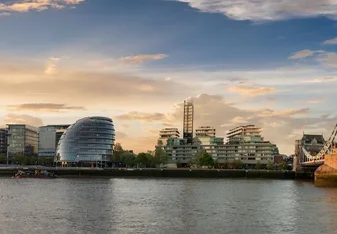Study Abroad Programs in Scotland
About
The stereotypes of Scotland, in all their tartan-draped and bagpipe-tuned glory, fall wonderfully short of the fantastically complex and diverse reality of this beautiful nation. Scotland is much more than its ancient castles and timeless highlands -- it’s a forward-thinking, creative, thriving country, filled with some of the U.K.’s most vibrant cities and picturesque towns.
These towns and cities are home to world-class educational institutions, including many of the oldest universities in the U.K. It is this combination of excellent education and engaging culture that makes Scotland one of the best study abroad destinations in Europe. And don’t worry -- the castles and highlands are never too far away if you need a study break or weekend getaway between class terms.
While the featured image on this guide may make you think you can enroll at Hogwarts for a semester abroad, unfortunately that's not an option! Instead, read on to learn about the different Scottish cities where you can study abroad plus tips for studying in Scotland. Below, you'll find study abroad programs in Scotland and reviews from past students to help you pick the perfect study abroad program in Scotland for you.
Where to Go
Every Scottish city has a different feel and atmosphere, so it’s up to you to decide what you feel like when choosing which Scottish city to study abroad in.
Edinburgh
With its hilltop castle, winding medieval alleys, cobbled streets, and souvenir shops stocking every tartan item imaginable, Edinburgh is Scotland as the rest of the world imagines it. It is a deeply historical place, but if you look beyond this you will also find a modern, cosmopolitan city with great food, drink, and cultural scenes. The city comes alive at New Year’s (the Scottish celebration of Hogmanay) and every August during the month-long Fringe Festival, the largest arts festival in the world.
Glasgow
Glasgow is Scotland’s biggest and coolest city. It is a center of arts, music, food, and innovation, blending Victorian grandeur with cutting-edge modernity. There are lovely parks, excellent museums, award-winning live music venues, and more pubs than you could ever hope to visit. The city’s slogan is People Make Glasgow, and it is entirely apt: Glaswegians are equal parts friendly, welcoming, passionate, funny, and quick-witted.
Aberdeen
Aberdeen is known as the Granite City thanks to its most common building material. On a cloudy day, the abundance of grey can seem like a downside, but when it’s sunny the city literally glitters in the light. It’s a good thing, then, that Aberdeen is known as the driest city in Scotland, which may have something to do with it being chosen as one of the happiest cities in the U.K.
St Andrews
This is a town, not a city, so it's not the best destination for thrill-seeking urban dwellers. However, the University of St Andrews is practically unmatched in the U.K. for history and prestige, creating a vibrant and tight-knit community of students. It also helps that the town is beautifully located by the sea, and boasts some great beaches.
Dundee
Dundee's seaside location is beautiful, but it is also practical: 90% of Scotland can be reached in a 90 minute's drive from the city. However, there is plenty to do and see in the city itself, such as the Antarctic ship RSS Discovery and the V&A Dundee, the much-anticipated second location for the London museum. But beyond the tourist attractions, Dundee is just a pleasant city. It's a big student hub, with good nightlife, food, and entertainment options, as well as plenty of lovely public spaces to enjoy the (surprisingly good) weather.
Planning Your Trip
Scotland is an easy country to adapt to for most students. All universities have diverse international student communities, meaning you will always find support and guidance when you need it. Your biggest challenges are likely to be getting the hang of the accent and getting used to the unpredictable weather.
How to Choose a Study Abroad Program in Scotland
There are three main criteria you need to look into: the city, the university, and the course. Which one you focus on will depend on what you want to get from your experience. For example, if you want a good qualification in a specific subject, you may want to check the Scottish university rankings for that subject to determine your ideal university.
If the student life is what’s important to you, then you should research the main cities to see which one is the best fit for your lifestyle: culture and music buffs should consider Glasgow, history lovers will be drawn to Edinburgh, while nature enthusiasts will prefer the beautiful, smaller cities of Dundee or St Andrews.
Housing
Most universities have their own halls of residence, in which first-year students normally live. These halls do not have room for everyone, but the universities do usually give priority to international students.
Most students then move to private accommodation in their second year, usually with people they have met during their first year of study. If you want to skip the halls stage (or if you don’t get a place), it is quite easy to find flatmates on sites like Gumtree or SpareRoom. The major Scottish student cities are all filled with student-friendly accommodation, with rent averaging £300-£450 ($380-$570) a month.
Visas
Citizens of E.U. countries do not need a visa to study in Scotland -- it is possible that this could change if Britain leaves the E.U., so keep yourself aware of the headlines there, and check with your local U.K. consulate as you start to apply for a visa to study abroad. International students from non-EU countries need a valid student visa. If you are coming to study in Scotland for 6 months or less, you need a Student Visitor visa. If you are doing a longer course of study, you will need a Tier 4 (General) Student Visa.
Social Life & Student Culture
It’s somewhat of a cliche to say that a country’s people are “welcoming”, but this is really true in Scotland. Scots are usually genuinely curious about foreigners, and happy to talk to them at length about their city.
Student culture in Scotland has a strong focus on nightlife, which can be incredibly fun, but it’s important to stay focused: many a student has regretted their nightly trips to the pub come exam time.
As for the Scottish accent: there is actually no such thing as a “Scottish accent”, with accents varying widely between regions and even nearby towns. This means that your accent struggles will depend on where you go: Edinburgh is quite smooth, while Glasgow and Aberdeen can take some getting used to. The good news is you will get used to it.
Health & Safety
The National Health Service (NHS) provides free healthcare for all permanent U.K. residents; this typically includes most students if you're in the country on a student class of visa. The cost of your visa will usually include a healthcare surcharge that allows you to receive NHS care at no additional cost. Make sure you register at a GP’s (General Practitioner's) office as soon as you arrive -- your university can recommend one. That will be your go-to doctor if you need care while studying in Scotland.
As is the case for every major city in the world, some Scottish cities likely have certain areas to steer clear of; these are usually not the student areas, so you're unlikely to encounter them. Read the local news in your city of choice to get a feel for this, or ask a local or student advisor at your host university.
Costs & Funding
Scottish universities have a slightly confusing pricing structure. Undergraduate Scottish and E.U. students can attend for free, while those from the rest of the U.K. pay up to a cap of £9,250. This cap does not apply for international (non-E.U.) students, meaning fees can be comparatively steep.
Typical Program Cost
Undergraduate study is completely free for E.U. citizens. If you are lucky enough to have an E.U. passport, you have access to world-class education with zero tuition fees. Although it is difficult to say how Brexit -- the U.K.’s exit from the E.U. -- will affect this arrangement, the Scottish government has declared that they intend to maintain it for the foreseeable future.
For everyone else, the fees can be relatively high. Undergraduate tuition fees for international students range between £15,000 and £30,000 per year, depending on the university. Postgraduate courses tend to be more expensive, but vary widely depending on the content, institution, and length of the program.
Funding Options & Scholarships
There are various sources of funding available for international students in Scotland, including the Commonwealth Scholarship and Fellowship Plan, Saltire Scholarships, and Fulbright Awards. Refer to this list of scholarships and grants for studying abroad to start your research into funding options.
Student loans from the government are not available to most international students. However, possible options include a Foreign Enrolled Student Loan or Study Abroad Loan.

























